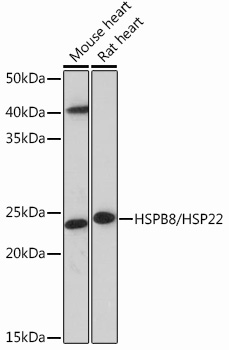Anti-HSPB8/HSP22 Antibody (CAB13518)
- SKU:
- CAB13518
- Product type:
- Antibody
- Reactivity:
- Human
- Mouse
- Rat
- Host Species:
- Rabbit
- Isotype:
- IgG
- Antibody Type:
- Monoclonal Antibody
- Research Area:
- Metabolism
Frequently bought together:
Description
| Antibody Name: | Anti-HSPB8/HSP22 Antibody |
| Antibody SKU: | CAB13518 |
| Antibody Size: | 20uL, 50uL, 100uL |
| Application: | WB IF |
| Reactivity: | Human, Mouse, Rat |
| Host Species: | Rabbit |
| Immunogen: | A synthesized peptide derived from human HSPB8/HSP22 |
| Application: | WB IF |
| Recommended Dilution: | WB 1:500 - 1:2000 IF 1:50 - 1:200 |
| Reactivity: | Human, Mouse, Rat |
| Positive Samples: | Mouse heart, Rat heart |
| Immunogen: | A synthesized peptide derived from human HSPB8/HSP22 |
| Purification Method: | Affinity purification |
| Storage Buffer: | Store at -20°C. Avoid freeze / thaw cycles. Buffer: PBS with 0.02% sodium azide, 0.05% BSA, 50% glycerol, pH7.3. |
| Isotype: | IgG |
| Sequence: | Email for sequence |
| Gene ID: | 26353 |
| Uniprot: | Q9UJY1 |
| Cellular Location: | |
| Calculated MW: | 22kDa |
| Observed MW: | 22KDa |
| Synonyms: | CMT2L, DHMN2, E2IG1, H11, HMN2, HMN2A, HSP22 |
| Background: | The protein encoded by this gene belongs to the superfamily of small heat-shock proteins containing a conservative alpha-crystallin domain at the C-terminal part of the molecule. The expression of this gene in induced by estrogen in estrogen receptor-positive breast cancer cells, and this protein also functions as a chaperone in association with Bag3, a stimulator of macroautophagy. Thus, this gene appears to be involved in regulation of cell proliferation, apoptosis, and carcinogenesis, and mutations in this gene have been associated with different neuromuscular diseases, including Charcot-Marie-Tooth disease. [provided by RefSeq, Jul 2008] |
| UniProt Protein Function: | HSPB8: Displays temperature-dependent chaperone activity. Monomer. Interacts with HSPB1. Interacts with DNAJB6. By 17-beta-estradiol. Predominantly expressed in skeletal muscle and heart. Belongs to the small heat shock protein (HSP20) family. |
| UniProt Protein Details: | Protein type:Heat shock protein Chromosomal Location of Human Ortholog: 12q24.23 Cellular Component: nucleoplasm; Golgi apparatus; cytoplasm; intracellular; nucleus Molecular Function:identical protein binding; protein binding; protein kinase activity Disease: Charcot-marie-tooth Disease, Axonal, Type 2l; Neuronopathy, Distal Hereditary Motor, Type Iia |
| NCBI Summary: | The protein encoded by this gene belongs to the superfamily of small heat-shock proteins containing a conservative alpha-crystallin domain at the C-terminal part of the molecule. The expression of this gene in induced by estrogen in estrogen receptor-positive breast cancer cells, and this protein also functions as a chaperone in association with Bag3, a stimulator of macroautophagy. Thus, this gene appears to be involved in regulation of cell proliferation, apoptosis, and carcinogenesis, and mutations in this gene have been associated with different neuromuscular diseases, including Charcot-Marie-Tooth disease. [provided by RefSeq, Jul 2008] |
| UniProt Code: | Q9UJY1 |
| NCBI GenInfo Identifier: | 13431576 |
| NCBI Gene ID: | 26353 |
| NCBI Accession: | Q9UJY1.1 |
| UniProt Secondary Accession: | Q9UJY1,Q6FIH3, Q9UKS3, B2R6A6, |
| UniProt Related Accession: | Q9UJY1 |
| Molecular Weight: | 196 |
| NCBI Full Name: | Heat shock protein beta-8 |
| NCBI Synonym Full Names: | heat shock 22kDa protein 8 |
| NCBI Official Symbol: | HSPB8 |
| NCBI Official Synonym Symbols: | H11; HMN2; CMT2L; DHMN2; E2IG1; HMN2A; HSP22 |
| NCBI Protein Information: | heat shock protein beta-8; protein kinase H11; alpha-crystallin C chain; E2-induced gene 1 protein; heat shock 27kDa protein 8; small stress protein-like protein HSP22 |
| UniProt Protein Name: | Heat shock protein beta-8 |
| UniProt Synonym Protein Names: | Alpha-crystallin C chain; E2-induced gene 1 protein; Protein kinase H11; Small stress protein-like protein HSP22 |
| Protein Family: | Heat shock protein |
| UniProt Gene Name: | HSPB8 |
| UniProt Entry Name: | HSPB8_HUMAN |





